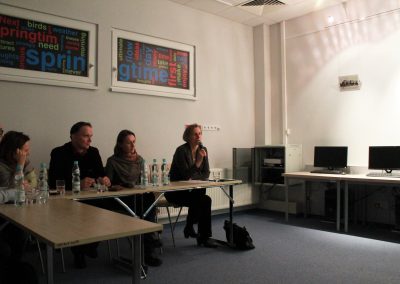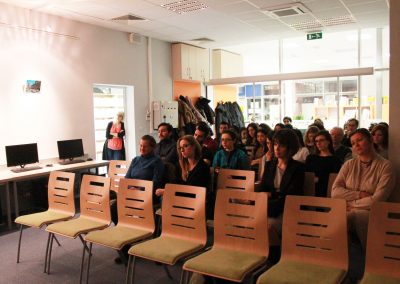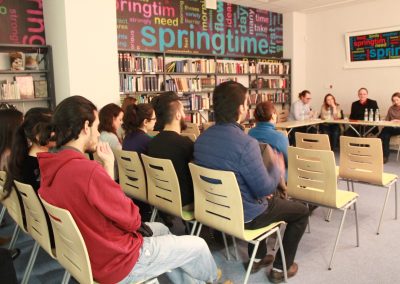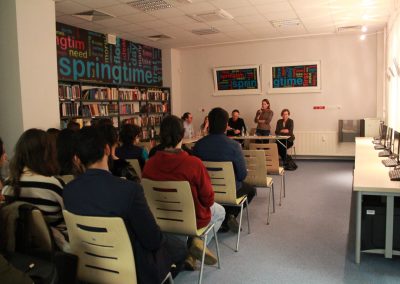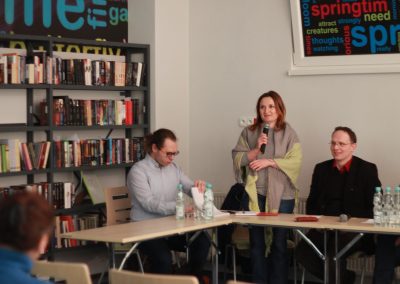On Wednesday we met in the Municipal Library Fil. 4 to participate in the debate entitled Gender ideology(ies): Man and woman – different by nature, inequal by society? We tried to find the answer to this question with our four guests: sociologists Borys Cymbrowski and Anna Czerner, philologist Katarzyna Molek-Kozakowska and biologist Elżbieta Pogoda.
We were aware that for most people the term gender is unfamiliar or even unfriendly, especially when someone is not a philologist or a social researcher, so we started with the basic questions: what gender is, how it exists in our respective fields of studies, and if there exists gender ideology. We can say that gender in general is about social consequences of being men, women or the others, because in the opinion of Elżbieta Pogoda even from a biological point of view there are more than only two sexes. And there is no evidence that one sex has an advantage over another.
In Polish media we encounter some false beliefs about the meaning of the word “gender”. But as Borys Cymbrowski mentioned it is a problem of confusion of nature with culture, because in the Polish language we have only one word (płeć) for gender and for sex. So some commentators confuse biological meaning with the cultural one. They accuse gender scholars of promoting a dangerous ideology which tries to convince people to choose their sex. As Anna Czerner said, the truth is that in the social sciences gender was a neutral category to analyse the relations between people in society, but unfortunately some institutions and politicians took one of the least popular topics in gender studies and used it as a basis to create and apply gender ideology as a political tool.
After that we focused mostly on language aspects within gender issues. Katarzyna Molek-Kozakowska indicated that for her it was easier to introduce herself in English than in Polish, because in Polish most names of academic professions have only a masculine gender, or even if it has a female gender, masculine forms sound more serious and more prestigious. But language is not a constant phenomenon – it is changing all the time. Twenty years ago we considered some female forms of words as strange, but today we take them for granted. We concluded that it is important to include more women-related forms to language, and it is one of the main catalysts of social changes in the public sphere.
We are really glad we could discuss it with you and with the citizens of Opole. We would like to thank you all for your presence and participation, and we hope to see you soon during another discussion. The aim of the whole debate was to clarify a little the problem of gender, but two hours is a short time when you are discussing such an important and complicated topic – so we treat this meeting only as a start. The debate is still open.

New safety rules
The Government of Poland is introducing further safety rules. Penalties for breaking those restrictions range from 5,000 to even 30,000 PLN. - Shops and banks: there can be up to 3 people for each cash desk (e.g. 3 cash desk in a store = 9 people at once). -...
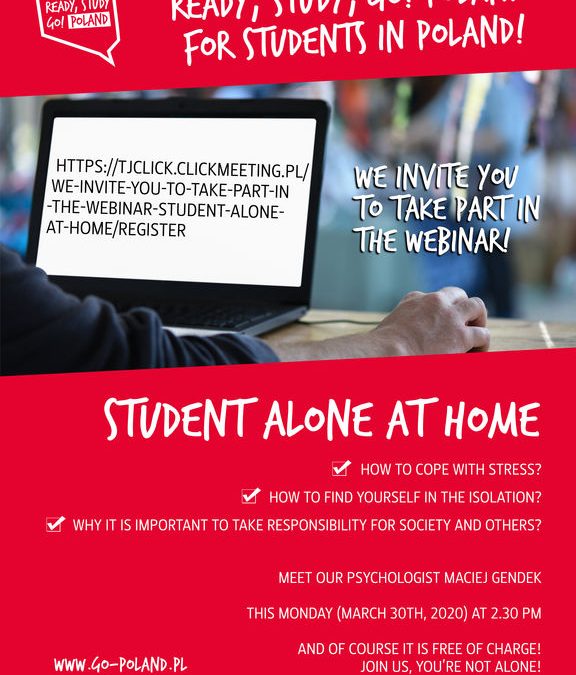
Webinar – Student alone at home
Dear Students! As part of the "Ready, Study, Go! Poland" campaign, the Polish National Agency for Academic Exchange organizes a series of webinars for students under the slogan: ‘Ready, Study, Go! Poland for students in Poland!’. On Monday, March 30th, at 2.30 pm, we...
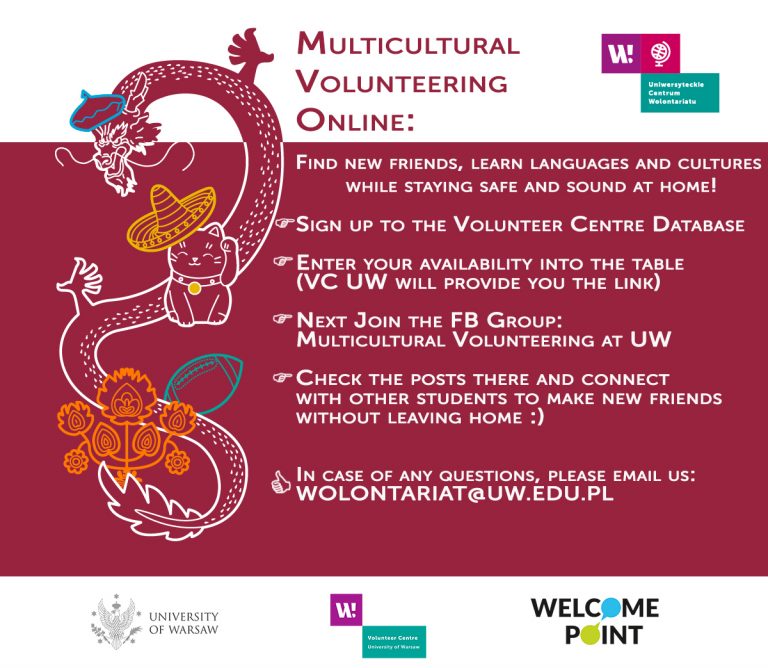
Multicultural Volunteering Online
The students from any university in Poland are invited to take part in the Multicultural Volunteering Online project run by the Volunteer Centre of the University of Warsaw and Welcome Point of the University of Warsaw. This is a great possibility to learn a new...

Join MS Teams
Dear Students! From now on you can use the Microsoft Teams tool in order to study from home. Here you can find out more on how to join MS Teams meetings. More News
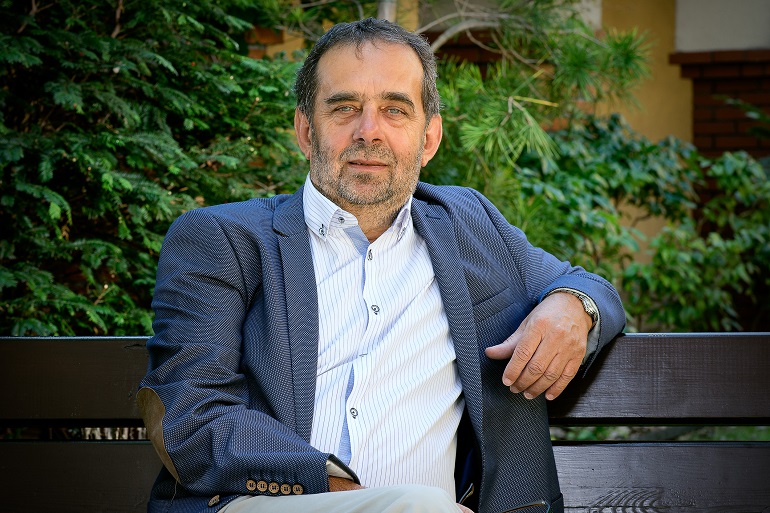
Letter from the Rector of the University of Opole to the University Community
Dear Students and Colleagues, This is the time of trial. The future will show if we can handle it. Today we are at war with an invisible and dangerous enemy. Every day I experience many positive reactions from you. I appraise your solidarity, commitment, and...

New safety rules
We are introducing new safety rules, including restrictions on movement! Until 11th of April, you will not be able to move freely, if it’s not necessary for living, health and professional purposes. Therefore, the restrictions do not apply to: travel to work. You...
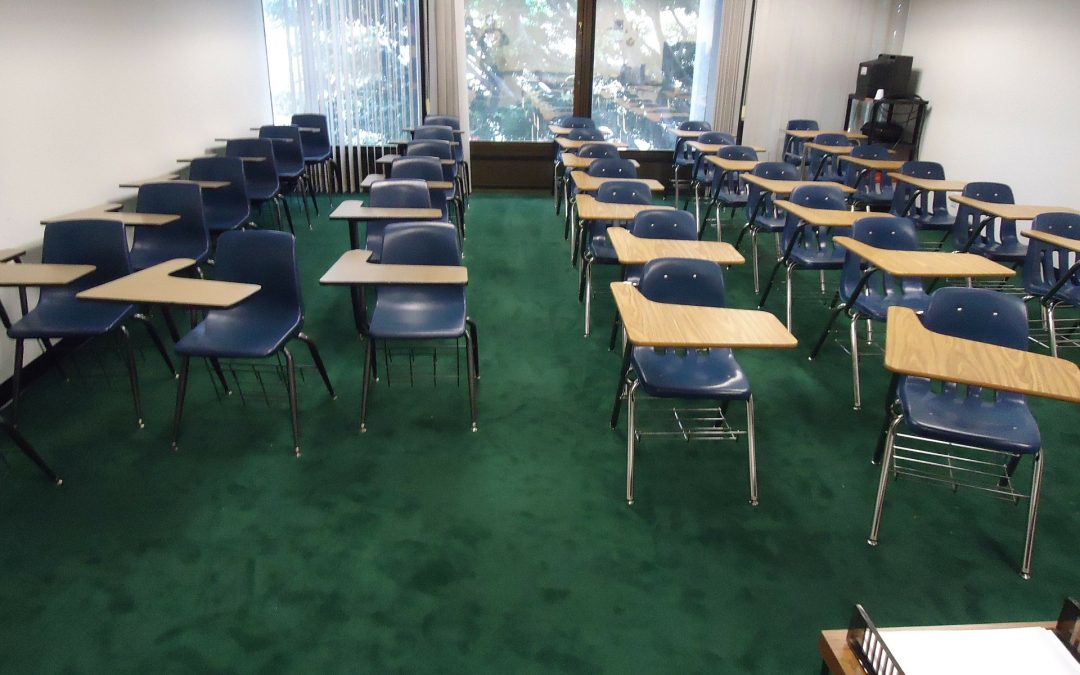
The functioning of the universities in Poland suspended until April 10
Dear Students! Minister of science and higher education Jarosław Gowin has announced the extention of suspension of universities in Poland until April 10 . The decision is caused by the introduction of the state of the epidemic in Poland. He emphasized that this is...
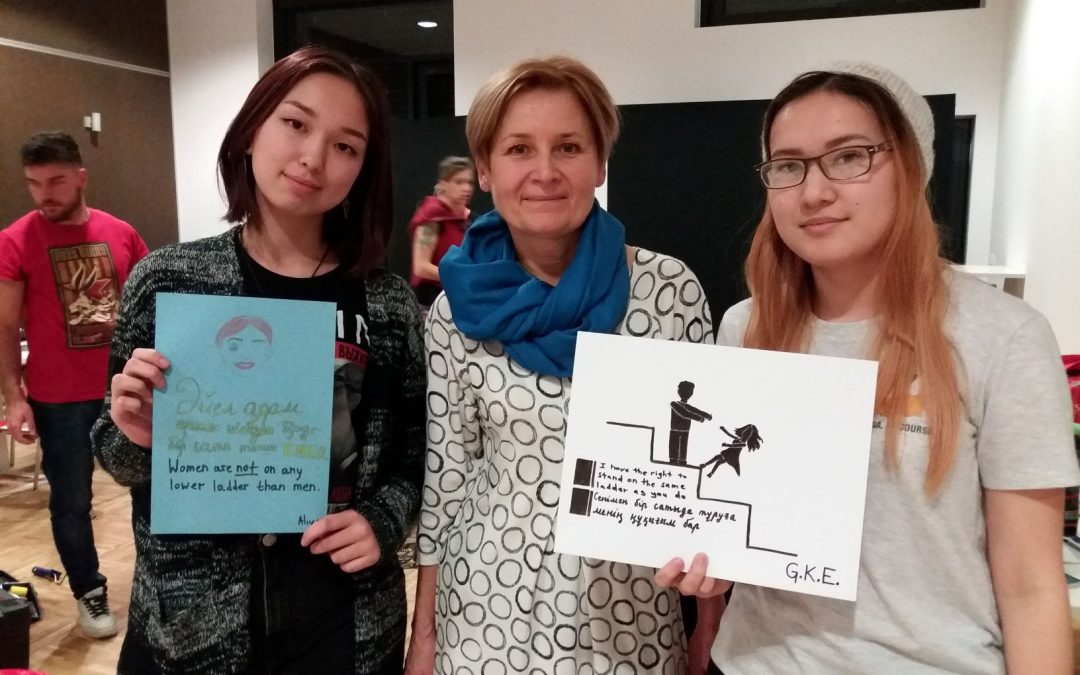
Rector’s Plenipotentiary for Equal Treatment
Dear Students, as university we are experiencing unusual and, for many, difficult time with different limitations which influence your everyday functioning. This time can also be emotionally challenging and as university we offer psychological consultations for the...
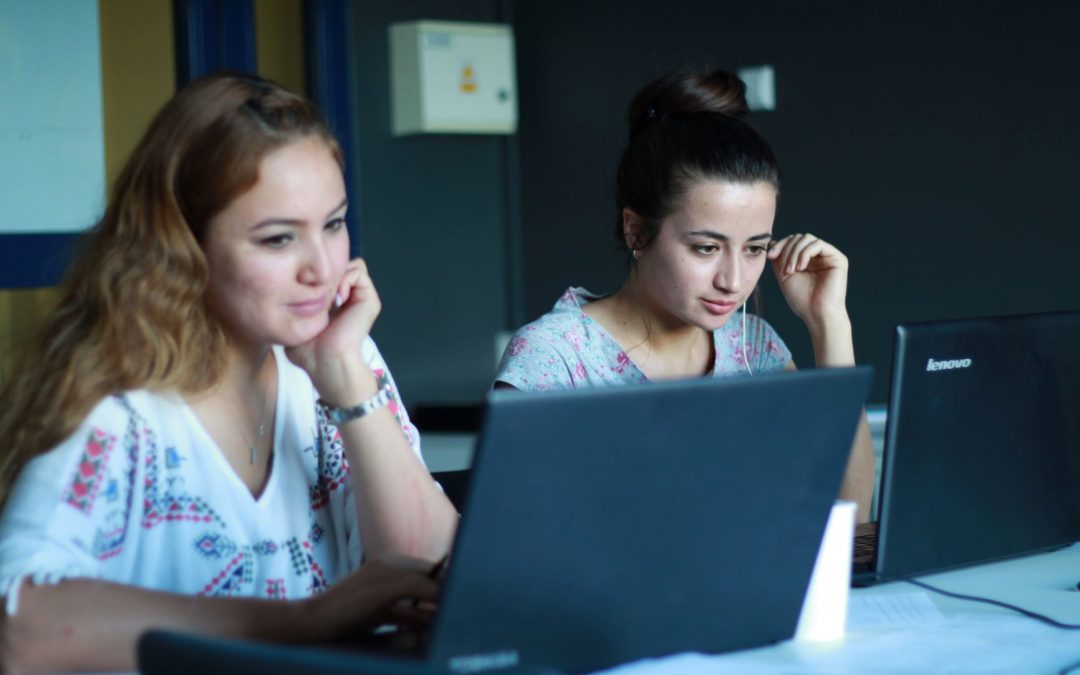
Library of the University of Opole
Dear Readers, During the closing period of the Library of the Opole University we encourage you to use electronic resources: http://bg.uni.opole.pl/. The university library provides assistance and services concerning the university: - searching in resources available...
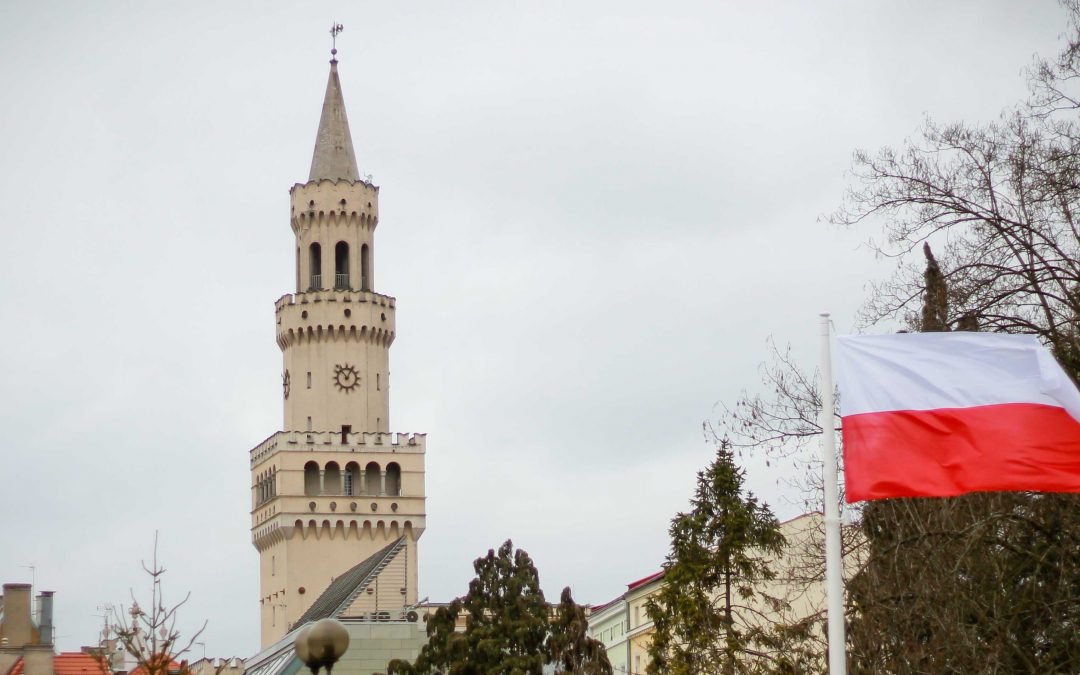
Legal stay of foreigners during the state of epidemic threat
Dear Students! Due to the state of epidemic threat, voivodeship offices have suspended direct customer service. Therefore, all applications for the legalization of stay of foreigners in Poland may be submitted by post. Applications for the legalization of stay of...
